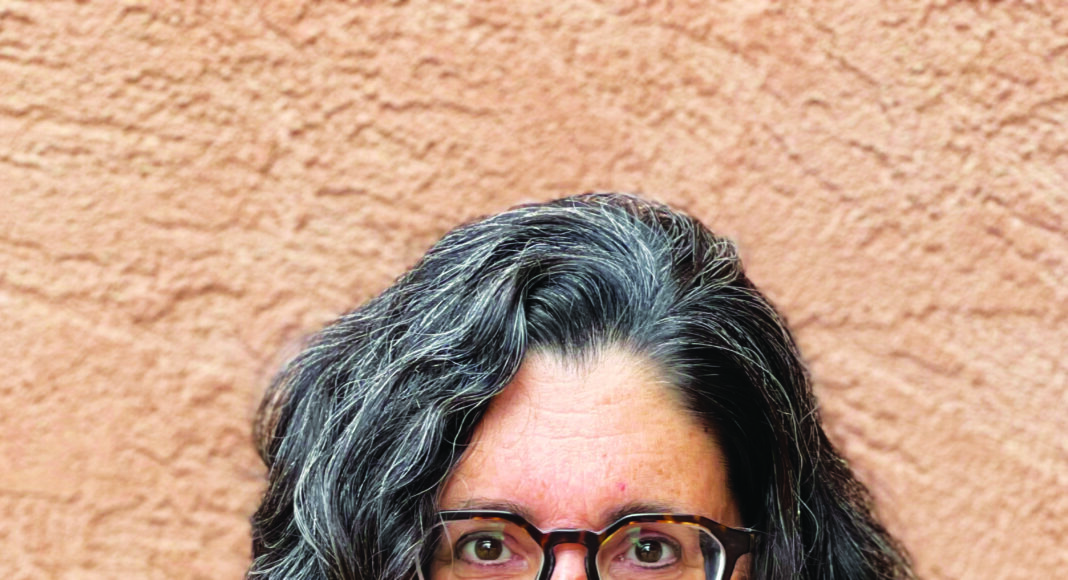Poet Laureate Farnaz Fatemi merges her Iranian heritage with American Experience
If part of the lure of poetry is in the community it offers, then poet laureate of Santa Cruz County, Farnaz Fatemi’s resolve to help bring the various contingencies of poets together is a gift to both poets and non-poets alike.
Fatemi comes by this longing for kinship honestly as she seeks to navigate the often-disparate worlds of her Iranian heritage with her American lived experience; and these are the themes that are explored in her prize-winning collection, Sister Tongue.
Fatemi grew up in Southern California, the daughter of Iranian immigrants and came to Santa Cruz after her twin sister expressed a desire to study with Lucille Clifton at the University of Santa Cruz. Fatemi says of her twin, “She was a poet from the beginning.”
While at UCSC in a class taught by the poet Alfred Arteaga, Fatemi began reading poets like Lorna Dee Cervantes and Alfred Arteaga. (She says reading the former was the reason she became a poet.) Although she wrote poetry while in college and read at open mics, she didn’t consider herself a poet. Yet, after college she found that she continued to write poems…perhaps more consistently than other pursuits. Wanting to learn more about the craft led her to attend graduate school at Mills College where she earned her MFA.
She taught briefly at Cabrillo College and part time for the colleges at UCSC. Eventually she joined the UCSC Writing Program. During the academic year she found it challenging to find time for her own writing and tried to make up for it in summers.
Fatemi recounts that in the mid-2000s she found herself in a funk. In 2009 a dear friend died suddenly of leukemia. She was just 39 years old. It was then that she knew she needed to write more, so she began a writing group with poets Lisa Allen Ortiz, Francis Hatfield, Ingrid LaRiviere and Danusha Lameris. This group continues to meet and is a source of inspiration and encouragement.
Fatemi says she worked on the poems in her first collection for nearly seven years before sending the manuscript out. In 2021 Sister Tongue won the Stan and Tom Wick Poetry Prize, selected by Tracy K. Smith. The unusual form of the work grew organically, in two streams…the prose and the poems were at first separate, but somehow she was able to combine the two.
Of Sister Tongue she says, “I inherited a world in a language I didn’t understand, and wanted to learn what was real in that world; and was trying to learn what it is to live with others who didn’t speak in my native tongue….this liminal space was experienced in different ways…I wanted to trust my curiosity about [the language…culture]…that it would lead to some sense of understanding, at least inside myself.
Fatemi has abundant energy for the job of poet laureate and lots of plans for projects already initiated and in the works. After 21 years of teaching at UCSC she says this is the perfect time to participate in the wider community of poetry and to give back.
Some programs she has helped develop include poetry (and music) in the parks with Santa Cruz County Parks; the inaugural youth poet laureate program for Santa Cruz County (applications will be ongoing through February 1,, 2024, and Fatemi will be sponsoring a series of workshops for teens in the fall which will consist of writing workshops, portfolio arrangement and performance skills.)
Much of her work is outreach and she collaborates with the County Office of Education, Arts Council Santa Cruz County and the poet laureate of the city of Watsonville, Bob Gomez. And Fatemi was the poet-in-residence at the 61st Cabrillo Festival of Contemporary Music this year.
In July Fatemi was chosen to receive $50,000 from the Academy of American Poets—one of 23 individuals who serve as poet laureates of states, counties and cities across the United States, through its Poet Laureate Fellowship program made possible through the Mellon Foundation.
Currently she is writing poems. Her writing process during this busy period is to write down one thing she has noticed each day. (This practice began with her book launch when she wanted to remember what happened at a reading, what someone said to her, if someone made her cry or laugh or touched her in some special way.)
In September she plans a residency where she will be able to get back to her “poet brain” and write. Fatemi says, “Poetry is something we can keep going deeper into…in a world that is so dominated by black and white thinking…poetry is a place where we can imagine uncertainty; a space where we don’t need to know all the answers.”
Borders
I know its shape—
my not-country
faraway home.
I know the space
it takes
the snail head
of Tabriz
at the top,
bulbous
spiral of the rest.
I’ve known
for decades
without knowing,
the way I didn’t know
what countries touch
the tender neck,
the belly or the shell
except Iraq
because my cousins
hoped not to die
on that front.
—Farnaz Fatemi
From Sister Tongue,
farnazfatemi.com
Magdalena Montagne is a local poet- teacher who leads drop-in poetry writing workshops throughout Santa Cruz County. Her website is www.poetrycirclewithmagdalena.com













